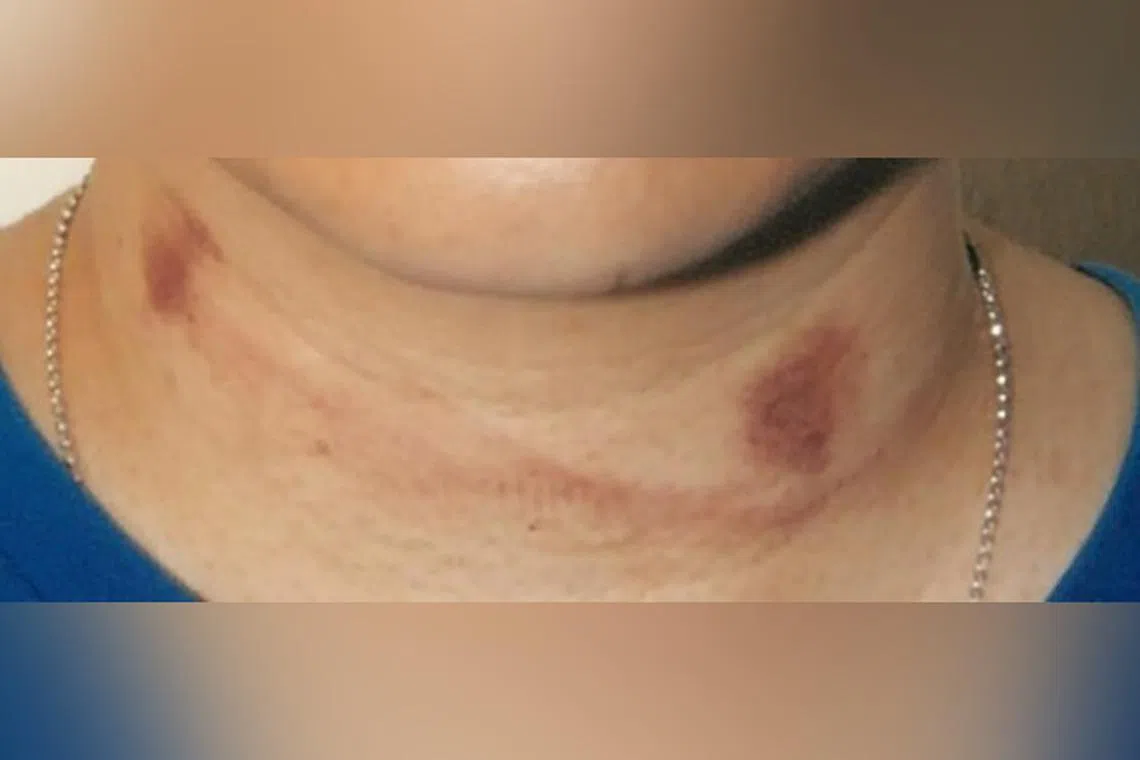Why acquittal reversed for man who raped ex-girlfriend: Use of violence evident, says apex court
Sign up now: Get ST's newsletters delivered to your inbox

The accused claimed that the bruises on the woman's neck were "love bites".
PHOTO: COURT DOCUMENTS
Follow topic:
SINGAPORE - A man who was accused of raping his former girlfriend while trying to strangle her claimed that they had consensual sex and that the bruises on her neck were “love bites”.
The 45-year-old man was initially cleared by the High Court in June 2020 following an 11-day trial.
In September 2022, his acquittal was reversed by the Court of Appeal after the prosecution appealed, and he was sentenced to 13 years’ jail and 12 strokes of the cane.
On Wednesday, the three-judge apex court issued written grounds setting out its reasons for convicting the man and for the sentence imposed.
“It was clear to us that the judge’s decision to acquit was wholly against the total weight of the objective evidence and the testimony of the prosecution’s witnesses,” wrote Justice Tay Yong Kwang.
One of the issues that weighed against the accused was that the use of violence was evident from the extent of the tear in the woman’s T-shirt and the damage to the fasteners of her brassiere, as well as the bruises on her neck.
The court, which also comprised Justices Judith Prakash and Woo Bih Li, said the bruises did not appear to be love bites.
In any case, the accused was not able to explain a line between the two bruises, which indicated that some injury was inflicted, said the court.
The damage to the brassiere fasteners also corroborated the woman’s account that the man used violence to subdue her, said the court.
Another issue that weighed against the accused was that the romantic relationship between him and the woman had clearly ended before the rape on Aug 6, 2017, said the court.
The man and the woman, who is now 34, are Malaysians who got into a relationship in 2012 while working in Singapore. In 2015, they rented a flat together.
In February 2017, the man lost his job and could not remain in Singapore for long periods of time. By May 2017, she asked him to move out because she wanted to end the relationship.
The court pointed out that the woman had not communicated with the man since July 21, 2017, until he turned up at the flat unannounced on Aug 2, 2017. This was despite the fact that he had sent her more than 100 messages during this period.
The woman’s response to his return, including staying with her aunt for two days, showed that she was totally uninterested in interacting with him, said the court.
The man’s behaviour after the alleged rape also betrayed his guilt, said the court.
After the assault, he took her to a nearby clinic, where she told the doctor that the man had sexually assaulted her. The doctor told his assistant to call the police, and the accused left before the police arrived.
He then sent the victim more than 60 messages apologising to her and begging her not to make a police report. He also sent voice messages to his family members, saying he was afraid that she would accuse him of “attempted rape”.
“If he held the genuine belief that he and (the victim) had consensual sex, there would have been absolutely no reason for him to assume that the police was at the clinic because of him,” said the court.
Finally, the Court of Appeal disagreed with the trial judge that the woman’s credibility was affected by inconsistencies in her evidence.
The apex court agreed that the woman was inconsistent when she told the clinic doctor she last had sex with the man in November 2016 and, later in court, admitted that the last time was in March 2017.
However, this did not affect the pivotal point of the evidence that their relationship had ended before August 2017, said the court.


